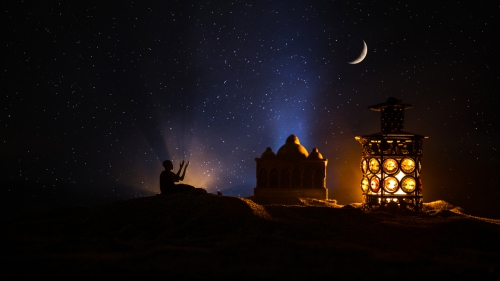Essence of Quran Appeals to Reason and Knowledge

The Quran is itself a witness that it is supremely magnificent and highly honorific; and by obeying it one can also attain magnificence and grace (16:64, 16:89, 29:51). The Quran does not require any external witness to this effect. It is a witness unto itself just as the Sun is witness unto itself. Though the Quran declares itself to be like this but those who were its addressee found it surprising:
بَلْ عَجِبُوا أَن جَاءَهُم مُّنذِرٌ مِّنْهُمْ فَقَالَ الْكَافِرُونَ هَـٰذَا شَيْءٌ عَجِيبٌ
(50:2) – But nay - they deem it strange that a warner should have come unto them from their own midst; and so these deniers of the truth are saying, “A strange thing is this!” [Asad]
Instead of pondering over the message of the Quran and asking whether it really is the word of Allah, these people were surprised that the person who has been bestowed with the Quran is an ordinary human being.
But the very essence of the Quran appeals to reason and knowledge. While the Quran removed all misunderstandings (18:1), the two of the most important among them were cult worship and superstitious beliefs.
The Quran addresses reality and advises humans to accept reality for their own benefit. It advises them to refrain from personality worship. It was not impossible for Allah to send His Book by using supernatural means or by miracles. He could have sent the complete written Quran directly from the heavens. But Allah chose a person living among them to send His revelation through him to the people so that he may serve as role model for others.
The high moral character of the Prophet (PBUH) before Prophethood
The Quran says that the Prophet (PBUH) used to declare:
قُلْ إِنَّمَا أَنَا بَشَرٌ مِّثْلُكُمْ يُوحَىٰ إِلَيَّ
(18:110; 41:6) – I am human being like you except that I receive Allah’s revelation.
And the Prophet (PBUH) told his people: I convey to you exactly and completely the Revelation that I receive. So, you have the same revelation that I have. We are all related to it as human beings including me. I have lived among you all my life (10:16). The Prophet (PBUH) presented his life as an evidence to his people that you can decide for yourself whether or not my life is that of an honest person. Their own history tells that they used to refer to the Prophet (PBUH) as “Amin” meaning honest and trustworthy.
The point of emphasizing that the Prophet (PBUH) was a human being is to demolish cult worship or superstition worship. There is nothing supernatural in the content of the revelation. It can be understood with reason and knowledge.
But we cannot understand how the revelation came down to the Prophet (PBUH) from Allah; and it should not concern us. Our relationship with Allah is only through His final Book, the Quran.
The Quran is to be understood using reason and knowledge
The Quran emphasizes again and again that one must think and ponder and use reason and knowledge to understand Allah’s final Revelation (4:82), now preserved and protected in the Quran until eternity (15:9). How this revelation came from Allah to the Prophet (PBUH) is a separate issue that is beyond human understanding. The relationship of humans with the revelation is with its content, not how it got here. Humans have received it. Now it is their job to understand it using all the knowledge available; and decide its value based on merit, not based on miracles or any supernatural factors.
The Prophet (PBUH) reminded his people repeatedly that I am a human being like you. The Quran is a book. So, try to understand it just as a book. After you have understood it, then decide on the basis of merit whether or not it is going to raise your moral standing in the world; whether or not it will confer dignity and self-respect on you in the world; whether or not it will confer power and authority to you in the world.
The Quran mentions that the Prophet's people were astonished when he claimed that he is receiving divine Revelation! They were telling him that a God’s messenger needs to be different; that he needs to have supernatural powers and perform miracles! The Quran repeatedly tells them that all divine messengers were human beings; and this last Messenger is also a human being like you except that he receives the revelation. But his people insisted that a messenger needs to be different.
This was then. But what happened later? Majority of Muslims flocked to anyone who showed “miracles.” They gathered around anyone who showed some magic tricks and claimed to be Sufi. After his death they started visiting his grave and praying to him! They are more attracted to superstitions than to knowledge and understanding. The Prophet (PBUH) came to demolish these things.
The Quran itself a miracle
The Meccans demanded again and again that if you are a Prophet (PBUH) then show some miracles. They claimed that this will convince them to believe that he really is a Prophet and Messenger of God; that he is in contact with God and is receiving divine revelation. At this, the Prophet (PBUH) repeatedly told them that I spent my whole life among you: Judge for yourself whether my life has been that of a true person or that of a liar. He told them that the revelation he is presenting, understand it and then judge it on merit.
It is mentioned in the Quran that if Allah showed them miracles by dropping a ladder from heaven and the Prophet (PBUH) went up the ladder and Allah gave him the Book while all the while they were looking at him, even then they would not believe (6:35). If they focus on understanding the revelation, then they will know that this Quran is itself a miracle. It is unchangeable and protected forever by Allah. And it will remain in front of humanity for all times to come. This is the real miracle of the Quran.
Even in this age of knowledge people flock to those who show magic. How they do these magical tricks, they keep it secret from the people. But there is nothing magical about it. Anyone can develop this ability provided one is able to go through the rigorous and perilous training and the harsh discipline that it involves.
The Quran fosters intellect and develops reason
The Quran not only appeals to reason but it also nourishes and develops it. The purpose for revealing the Quran is:
إِنَّا جَعَلْنَاهُ قُرْآنًا عَرَبِيًّا لَّعَلَّكُمْ تَعْقِلُونَ
(43:3) – behold, We have caused it to be a discourse in the Arabic tongue, so that you might encompass it with your reason. [Asad]
Allah has made the Quran unambiguous and absolutely clear (16:89). It shows the truth, so that anyone can understand it by using one’s intellect; so that anyone can use reason and logic to understand it. This will develop and nourish human intellectual abilities. This is the real spiritualism unlike the fake spiritualism of Mysticism. The Quran addresses realities of life; it provides real solutions for real problems facing humanity; its teaching is a guiding light of truth and therefore it illuminates the path of humanity (4:174, 14:1, 64:8). This is its essence and reality. When people asked the Prophet (PBUH) for a miracle he said the Quran itself is the miracle that I am presenting to you.
The Quran came to wipe out all superstitions. It tells the Prophet (PBUH) to declare:
قُلْ هَـٰذِهِ سَبِيلِي أَدْعُو إِلَى اللَّـهِ ۚ عَلَىٰ بَصِيرَةٍ أَنَا وَمَنِ اتَّبَعَنِي
(12:108) – Say [O Prophet]: "This is my way: Resting upon conscious insight accessible to reason, I am calling [you all] unto God - I and they who follow me." [Asad]
Tell them that this is my way which is very clear and straight. My call is based on firm conviction, reason, knowledge, and understanding – mine as well as that of my followers.
We see what our Prophet (PBUH) is declaring in the Quran. This is the Sunnah of the Prophet (PBUH) that he himself declares that he follows; and he declares that those who claim to obey his Sunnah must also follow. But what is the reality in practice? Listen to any sermon from any pulpit by those who proclaim the Prophet's Sunnah? The preachers in their sermons recite a verse of the Quran and then what follows after that is weaving together narrations after narrations describing miracles after miracles of the Prophet (PBUH) mesmerizing the audience and turning off their intellect and thought. As we can see from the above verse these kinds of sermons have nothing to do with the Prophet (PBUH).
When people get emotionally and psychologically attached to listening to stories of miracles and supernatural feats attributed to the Prophet (PBUH) then they lose their ability to think. This appeals to people because critical thinking requires mental challenge; it requires considerable intellectual energy and fortitude. Whereas listening to stories and miracles requires no mental effort.
This was a great conspiracy that was hatched against Islam so that kings (in collusion with scholars) could keep the masses ignorant; so that the masses never could question their illegitimate existence in Islam.
Allama Iqbal puts it succinctly and cogently in few words:
Make Muslims remain absorbed in prayers and rituals
Let them follow monastic way of life and worship graves
Spread this kind of Islam and turn off this Ummah’s thinking clock! And let them daydream and slumber! Allama Iqbal beautifully captures this mindset:
If they ever happen to wake up from this daydream
Let the magic of rulers and scholars put them to sleep
This was exactly the reason that Quraysh were demanding miracles from the Prophet (PBUH). They could not imagine a Prophet (PBUH) being an ordinary human being.
Stop and think – Prophet’s plea
On the other hand, the Prophet (PBUH) constantly appealed to his Ummah to think:
قُلْ إِنَّمَا أَعِظُكُم بِوَاحِدَةٍ ۖ أَن تَقُومُوا لِلَّـهِ مَثْنَىٰ وَفُرَادَىٰ ثُمَّ تَتَفَكَّرُوا
(34:46) – Say: “I counsel you one thing only: Be [ever conscious of] standing before God, whether you are in the company of others or alone; and then bethink yourselves. [Asad]
Tell them O Messenger: I neither want to enter into unnecessary lengthy discussions with you nor do I want to give you a long lecture. All I ask of you is, whether in pairs or alone, that you stop for a while and think!
أَفَلَا يَتَدَبَّرُونَ الْقُرْآنَ ۚ وَلَوْ كَانَ مِنْ عِندِ غَيْرِ اللَّهِ لَوَجَدُوا فِيهِ اخْتِلَافًا كَثِيرًا
(4:82) – Will they not, then, try to understand this Qur’an? Had it issued from any but God, they would surely have found in it many an inner contradiction! [Asad]
Topics: Critical Thinking, Humanity, Intellect, Miracles, Miracles Of The Quran, Prophet Muhammad (S), Quran, Revelation Values: Guidance, Knowledge, Spirituality
Views: 4699
Related Suggestions
















